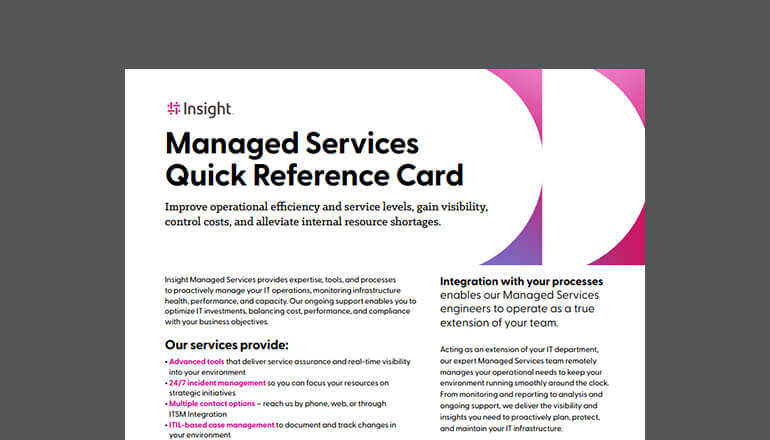Blog IT Managed Services: IT’s Path to Upskilling — And Driving Business Outcomes
By Steven Walters / 7 Oct 2021

IT managed services are providing more than basic services to fill resource gaps — they’re helping IT teams hone skills that were never even considered relevant to the business.
It’s common to focus on the stressors of IT in the trenches. Shortages. Outages. Thwarting cyberattacks. The legacy IT frankenstack. These are valid obstacles to talk about — we help clients tackle them every day. But we shouldn’t overlook one of the biggest shifts in IT managed services history: IT pros are shifting gears from task-focused to business-minded, and charting an entirely new path forward.
Let’s take a look at how managed services are enabling that progress.
From IT staff augmentation to business integration
The role that IT managed services plays now compared to 10 years ago is almost unrecognizable. Years ago, managed services were used for reinforcement, mainly — outsourcing IT services to a distant team that would run components of the tech stack. Cost optimization and savings were big drivers. IT teams were mostly concerned with hitting service levels.
Today, our clients are seeking a more integrated experience with managed services. They’re asking where they can take advantage of best practices and processes. Our team isn’t telling clients, “Here’s your capacity report. Go read it.” We’re engaged on a completely different level, meeting regularly, providing trend analysis and calling attention to what the organization needs to start planning for.
Arming IT teams with this new level of knowledge means they’re earning a well-deserved seat at the table, using their deeper understanding of the technology-business through line to help leadership set a tech-first vision — and understand what it will actually take to realize it.
Done right, managed services are about helping IT better understand its environment, break down silos and get strategic about long-term goals.
The business world is investing in upskilling.
In LinkedIn’s 2021 Workplace Learning Report, 59% of learning and development (L&D) pros listed upskilling and reskilling as their number one priority for 2021. Companies are even offering financial reward incentives for employees who are excelling in these types of training programs.
McKinsey & Company’s “Building the Vital Skills for the Future of Work in Operations” report is a great testament to the blurring of lines between business and IT. In the report, McKinsey recommends that training programs:
- Focus on technology alongside business processes, management systems and people.
- Approach automation and digitalization as a comprehensive program — with leadership involving teammates from all levels in the process.
As business integration deepens and silos fall by the wayside, managed services will continue to provide the reliability that IT pros need to make this cultural shift.
In-demand IT skills for a tech-driven world
Technology is rapidly evolving, and managed services can decrease operational burden and help IT pros focus on building more thoughtful, business-focused strategies around:
- Cloud-native environments
- Artificial intelligence
- Machine learning operations
- Natural language processing
- Data science
According to Alex Brower, VP of marketing at digital training company Cloud Academy, "IT professionals need to reinvent themselves every four years. It's a constant state of learning. For an individual, it's important not to just learn Ruby on Rails because it's the first thing you came across, but how you invest your precious spare time."
By developing more skills around business strategy — and gaining deeper knowledge around cutting-edge technologies — IT has an opportunity to become more well-rounded advisors to the business.
The new IT: Strategic and resourceful
The myth that outsourcing implies ineffectiveness is dated. Today, leveraging managed services means an IT organization is in command of where it wants to be from a maturity perspective. It’s advancing its people. It’s leveraging resources intentionally. And with a commitment to upskilling and reskilling, it will be ready for the change that’s now — and forever will be — so second nature to this industry.
If you’re ready to make the shift to a managed services model, my team and I are in your corner. Explore our managed services offering and some of the ways we’ve helped organizations run smarter.




